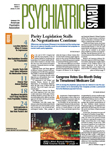A number of Medicaid services for people with mental illness provided under “targeted case management” face steep cuts under an interim final rule scheduled to go into effect on March 3.
The proposed cuts stem from regulations to implement part of the Deficit Reduction Act of 2005, which identified areas of the Medicaid program where cost-saving steps should be taken. The changes included in the interim final rule, posted in the Federal Register on December 4, 2007, outline what services can be covered under case management, bar payment for certain services traditionally furnished by child-welfare-system case managers, and prohibit Medicaid payment for services for which another party is liable. Federal officials estimate that the changes would save $1.28 billion over five years.
Targeted case management (TCM) programs assist people with significant disabilities who need service coordination across different public agencies. The practical impact of the administrative changes are to prohibit federal Medicaid payments for certain services for children in foster care, abused and neglected children, the elderly, and those with mental illness, for which states have long been reimbursed, according to Lizbet Boroughs, deputy director of APA's Department of Government Relations.
Bush administration officials “have been incredibly aggressive about making administrative changes that have significant consequences” and often are a way to bypass congressional opposition, said Boroughs.
APA and other health care and patient advocacy organizations have joined the National Governors Association and the National Council of State Legislatures to lobby for congressional action to block the TCM changes. But opponents of the changes appear to lack the strength in a closely divided Congress to reverse the administration's actions.
The 60-day public comment period on the rule ends February 4. Sen. Norm Colemen (R-Minn.) and Rep. Keith Ellison (D-Minn.) have told the media, however, that they plan to introduce legislation to delay the implementation of the TCM changes for six months by extending the public comment period on the proposals.
Mental health advocates were urged by the Bazelon Center for Mental Health Law—a member, along with APA, of the Mental Health Liaison Group—to submit comments “to increase the likelihood of modifications” to the administration's proposed TCM regulations.
The following are among the major changes proposed in the interim final rule:
•
Limit Medicaid beneficiaries receiving case management to one plan and one case manager.
•
Require case management to be billed in 15-minute increments, instead of monthly.
•
Bar case management as a required service and restrict case managers from functioning as gate keepers to other services.
•
Restrict case-manager services to referral activities.
Bush said when he signed the Deficit Reduction Act that the cuts would bring needed restraint to Medicaid spending and help reach his goal of cutting $25 billion from Medicaid over the subsequent five years. The 2008 federal share of the state and federal Medicaid program is estimated at $196 billion.
State officials countered that the TCM changes are short-sighted; they impact programs that are effective and reduce future government costs by preventing disruption of lives that would occur without the TCM-supported programs. At least 38 states use TCM.
The changes follow stepped-up federal enforcement of TCM regulations, which has resulted in massive fines in recent months in Maine and Minnesota levied by the Office of the Inspector General.
“Increasingly, states' ability to use Medicaid funding to implement targeted case management for children in the child-welfare system have been restricted. Governors encourage the administration to make it easier for states to use Medicaid funding to implement targeted case management for children in the child-welfare system,” said a statement from the National Governors Association.
TCM services are not the only Medicaid services that the Bush administration has targeted for cost cutting. Other regulatory changes have sought to restrict federal funding for services that transport severely disabled children to school and provide them with school health aides. These services have been reimbursed to comply with the Americans With Disabilities Act of 1990.
“These are high-cost services for which the states have been billing the federal government for years, and the feds don't want to pay for them anymore because the cost of Medicaid and Medicare is so enormous,” said Boroughs, “and where they are cutting is among the two populations that traditionally have no voice—children and adults with severe disabilities.”
